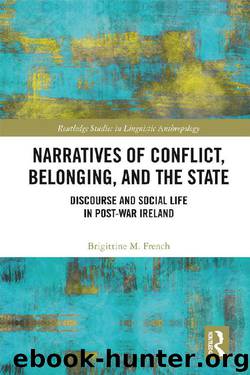Narratives of Conflict, Belonging, and the State: Discourse and Social Life in Post-War Ireland (Routledge Studies in Linguistic Anthropology) by Brigittine M. French

Author:Brigittine M. French [French, Brigittine M.]
Language: eng
Format: epub
ISBN: 9781138744325
Publisher: Taylor and Francis
Published: 2018-04-27T05:00:00+00:00
Fine
69
62.1
Adjournment
19
16.2
Dismissal
17
14.4
Unknown
8
7.2
(from above cases)
Threat of Industrial School
20
18.0
In Loco Parentis: Children, Physical Punishment, and Bodily Violence
In addition to the contingencies of state responses to truant youth that produced multiple outcomes in court cases, which were predicated upon some prior or future form of physical punishment for children, individuals and families were agents in challenging the children’s experiences of corporal punishment as a cumplusory part of their education. While Maquire and Ó Cinnéide (2005) have cogently argued, “It is clear from all the available evidence that corporal punishment was commonplace and that parents themselves generally supported a teacher’s right to punish their children” (639), this discourse-centered approach enables us to see how some families dynamically challenged state actors and critiqued teachers’ right to physically beat and harm their children in school.
On April 6, 1933, Ms. B Reynolds of Lahinch learned from her daughter that the local teacher, Miss Foley, had beaten the child with a ruler for being a persistent offender of school rules. The mother then went directly to the school to confront Foley, going so far as to physically assault her (Clare Champion, May 6, 1933b). A similar case happened in Sixmilebridge, when Michael Reddan went to the national public school to confront the local teacher who beat his 8-year-old orphaned cousin residing in the household. In this instance, Reddan not only struck the teacher in the heat of the moment, but later named the teacher’s action a form of violence against the child and further critiqued the system that allowed teachers to beat children in schools. When called before the court, Reddan directly challenged the teacher: “Why did you beat the child on two mornings? She is using terrible violence towards this child at school” (Clare Champion 1933a). After confronting the teacher, Reddan shifted addressees to denounce the teacher’s actions to the judge and listening/reading public, explicitly naming the beating a form of violence. As the case against Reddan progressed, he continued to attempt to shift the frame from his assault on the teacher to use the legal forum as a space to challenge the violent treatment of his cousin and other children in local schools.
Download
This site does not store any files on its server. We only index and link to content provided by other sites. Please contact the content providers to delete copyright contents if any and email us, we'll remove relevant links or contents immediately.
| Anthropology | Archaeology |
| Philosophy | Politics & Government |
| Social Sciences | Sociology |
| Women's Studies |
Cecilia; Or, Memoirs of an Heiress — Volume 1 by Fanny Burney(32548)
Cecilia; Or, Memoirs of an Heiress — Volume 2 by Fanny Burney(31947)
Cecilia; Or, Memoirs of an Heiress — Volume 3 by Fanny Burney(31932)
The Great Music City by Andrea Baker(31917)
We're Going to Need More Wine by Gabrielle Union(19035)
All the Missing Girls by Megan Miranda(15962)
Pimp by Iceberg Slim(14489)
Bombshells: Glamour Girls of a Lifetime by Sullivan Steve(14058)
For the Love of Europe by Rick Steves(13933)
Talking to Strangers by Malcolm Gladwell(13350)
Norse Mythology by Gaiman Neil(13349)
Fifty Shades Freed by E L James(13233)
Mindhunter: Inside the FBI's Elite Serial Crime Unit by John E. Douglas & Mark Olshaker(9324)
Crazy Rich Asians by Kevin Kwan(9280)
The Lost Art of Listening by Michael P. Nichols(7494)
Enlightenment Now: The Case for Reason, Science, Humanism, and Progress by Steven Pinker(7306)
The Four Agreements by Don Miguel Ruiz(6745)
Bad Blood by John Carreyrou(6611)
Weapons of Math Destruction by Cathy O'Neil(6267)
